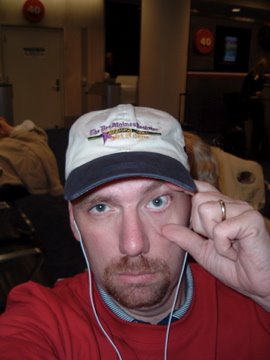So Who Needs Rolling Stone Anyway?
Arctic Monkeys was a big indie-music find earlier this year, a phenomenon that ignored the old-media rules of radio airplay and coverage in the music-fan magazines like Rolling Stone and Spin. Now add Broken Social Scene to the list of out-of-nowhere bands that are telling Clear Channel that they're needed as much as Clear Channel needs the Dixie Chicks.
What both are taking advantage of is Internet-based music distribution tools and online fanzines that have low overhead and thus can promote bands on quality alone and not on the "need for popularity," as Michael O'Shaughnessy and Jane Stadler argue in our Mass Communication and Society textbook.
In the case of Brooklyn-based Broken Social Scene, the golden nugget has been pub with online music tastemaker Pitchfork. As Dave Itzkoff reports in this month's Wired, Pitchfork editor Ryan Schreiber "plucked the record from the slush pile at random" among the thousands of discs he receives, most of which he doesn't have time to listen to -- even if he wanted to. On the one hand, Schreiber wrote, BSS had bad packaging that made them appear to be "the most unimaginative, bleak, whiny emo bastards in the whole pile."
Then he listened to the CD and found that it "explodes ... with song after song of endlessly playable, perfect pop." That was enough to make bandleader Kevin Drew's phone ring off the hook, and a June appearance on Letterman confirmed the band as summer indie-music darlings.
How can Pitchfork pay attention to the music rather than the fad? Itzkoff, a former editor at Spin, says it's simple: "The trouble we had at Spin was that although there were still new and emerging indie-rock acts worth getting excited about, none would ever be big enough to sell a magazine that had to reach half a million consumers every month just to stay alive."
What both are taking advantage of is Internet-based music distribution tools and online fanzines that have low overhead and thus can promote bands on quality alone and not on the "need for popularity," as Michael O'Shaughnessy and Jane Stadler argue in our Mass Communication and Society textbook.
In the case of Brooklyn-based Broken Social Scene, the golden nugget has been pub with online music tastemaker Pitchfork. As Dave Itzkoff reports in this month's Wired, Pitchfork editor Ryan Schreiber "plucked the record from the slush pile at random" among the thousands of discs he receives, most of which he doesn't have time to listen to -- even if he wanted to. On the one hand, Schreiber wrote, BSS had bad packaging that made them appear to be "the most unimaginative, bleak, whiny emo bastards in the whole pile."
Then he listened to the CD and found that it "explodes ... with song after song of endlessly playable, perfect pop." That was enough to make bandleader Kevin Drew's phone ring off the hook, and a June appearance on Letterman confirmed the band as summer indie-music darlings.
How can Pitchfork pay attention to the music rather than the fad? Itzkoff, a former editor at Spin, says it's simple: "The trouble we had at Spin was that although there were still new and emerging indie-rock acts worth getting excited about, none would ever be big enough to sell a magazine that had to reach half a million consumers every month just to stay alive."


0 Comments:
Post a Comment
<< Home